One simple yet effective tool that many are turning to is the sleeping mask. These seemingly simple accessories do more than just block out light; they create a tranquil environment conducive to restorative sleep. In light of that, let’s explore how sleeping masks can significantly improve sleep quality and, in turn, bolster mental health. From understanding their benefits to tips on choosing the right one, we’ll guide you on how to make sleep a priority in your wellness journey.
How Does Sleep Affect Mental Health?

Sleep plays a crucial role in maintaining mental health, serving as a foundational pillar for emotional stability and cognitive function. When we sleep, our brains undergo essential processes that help regulate mood, consolidate memories, and support overall psychological resilience. Research shows that adequate sleep is linked to lower levels of anxiety and depression. Conversely, chronic sleep deprivation can lead to increased emotional reactivity, irritability, and a heightened risk of developing mental health disorders. Sleep allows our brains to process emotions and experiences, helping us navigate daily challenges with a clearer mindset.
Many individuals struggling with conditions such as anxiety, depression, and bipolar disorder often experience sleep disturbances, creating a vicious cycle where poor sleep exacerbates mental health symptoms, while mental health issues further disrupt sleep patterns. Conditions like insomnia and sleep apnea are particularly common among those with anxiety and depression, highlighting the need for effective sleep management as part of a comprehensive mental health strategy.
Studies have shown that nearly one in three adults does not get enough sleep, with significant implications for mental health. A lack of sleep has been associated with increased rates of mood disorders, cognitive decline, and diminished ability to cope with stress. Understanding these statistics underscores the importance of prioritizing sleep in our quest for better mental health.
Which Mental Health Issues Are Linked to Poor Sleep?
Poor sleep is closely linked to various mental health issues, significantly exacerbating conditions such as depression and anxiety. Inadequate sleep can lead to heightened emotional sensitivity and increased irritability, intensifying feelings of hopelessness and depression, as well as amplifying anxious thoughts.
Sleep disorders, such as insomnia and sleep apnea, disrupt not only restful sleep but also essential cognitive functions like attention, memory, and decision-making. This impairment can hinder an individual’s ability to process emotions and cope with stress, creating a cycle of emotional dysregulation. When cognitive function declines, the risk of negative thought patterns increases, further fueling anxiety and depressive symptoms.
The relationship between sleep and mental health is bidirectional; while poor sleep can worsen mental health disorders, unresolved mental health issues can also contribute to sleep disturbances. Addressing sleep disorders is imperative for effective mental health management, highlighting the vital role of restorative sleep in promoting psychological well-being.
What Are Sleeping Masks and How Do They Work?

Sleeping masks, often referred to as sleep masks or eye masks, are simple yet effective tools designed to block out light, creating a darker environment that promotes better sleep. Typically made from soft, comfortable materials, these masks fit snugly over the eyes, ensuring that ambient light from street lamps, electronic devices, or other sources doesn’t disrupt the sleep cycle.
The primary function of a sleeping mask is to reduce light exposure, which is crucial for regulating the body’s natural sleep-wake cycle, or circadian rhythm. When our eyes perceive darkness, the brain releases melatonin, a hormone that signals it’s time to sleep. By blocking out light, sleeping masks can help increase melatonin production, making it easier to fall asleep and stay asleep.
In addition to their light-blocking capabilities, many sleeping masks are designed with added features for enhanced comfort and relaxation. Some masks are padded or contoured to fit the face better, while others may incorporate cooling gel or soothing scents, further promoting a restful sleep experience. The combination of darkness and comfort can significantly improve sleep quality, making sleeping masks a popular choice for those seeking to enhance their nightly rest.
How Do Sleeping Masks Improve Sleep Quality?
Sleep masks are a simple yet effective tool for enhancing sleep quality by blocking ambient light, which plays a crucial role in the body’s sleep-wake cycle. Exposure to light can inhibit the production of melatonin, the hormone responsible for regulating sleep. By creating a dark environment, sleep masks promote increased melatonin levels, facilitating deeper sleep cycles.
Recent studies have demonstrated the positive impacts of consistent sleep mask use on alertness, memory, and cognitive function. For instance, research shows that individuals using sleep masks experience improved daytime alertness and enhanced memory retention, likely due to the better quality of deep sleep achieved.
By reducing light exposure, sleep masks not only foster a more restorative sleep but also support cognitive performance, making them a valuable asset for those seeking to optimize their rest and overall mental function. In essence, incorporating sleep masks into your nightly routine can significantly elevate your sleep quality, melatonin production, and cognitive well-being.
What Mental Health Benefits Can Sleeping Masks Offer?
Sleep masks offer significant mental health benefits by promoting better sleep quality, which is crucial for overall well-being. The calming effect of soft materials in sleep masks creates a soothing environment, helping to alleviate stress and anxiety as one prepares for rest. By gently shielding the eyes from disruptive light interference, sleep masks create a darkened environment conducive to deeper, uninterrupted sleep.
Better sleep quality not only enhances mood but also supports cognitive function, leading to improved focus and decision-making during waking hours. With consistent use, sleep masks can become a valuable tool for those seeking refuge from busy lifestyles, allowing the mind to rejuvenate. The connection between restful sleep and mental health is well-documented; quality rest helps regulate emotions and reduces the risk of anxiety and depression.
Incorporating sleep masks into a nightly routine can be a simple yet effective way to enhance sleep quality, ultimately fostering a healthier mental state. By addressing light interference and providing a calming, comforting sensation, sleep masks serve as an essential aid for those striving for improved mental health.
How Do You Choose the Right Sleeping Mask?

Choosing the right sleep mask involves considering several key factors: material, fit, and light-blocking capabilities. Opt for breathable, hypoallergenic fabrics like cotton or silk to ensure comfort, especially for sensitive skin. The right material enhances your sleeping experience by preventing irritation and allowing your skin to breathe.
Fit is another crucial aspect; a contoured design can accommodate various sleeping positions, helping the mask stay securely in place without causing discomfort. Make sure the mask contours well to your face to block out light effectively.
Light-blocking capabilities are essential, as an effective mask significantly reduces distractions from ambient light, promoting deeper sleep. Individuals differ in their preferences—some may favor soft surfaces, while others might benefit from masks with cooling or heating features that cater to their sleeping habits.
Ultimately, the perfect sleep mask is one that combines comfort, effective light-blocking, and a secure fit, tailored to your personal preferences. Remember, don’t rush your decision. Take the time to find a mask that meets these criteria for the best sleep experience.
How Can You Incorporate Sleeping Masks into Your Sleep Routine?

Incorporating a sleeping mask into your nightly routine can be a straightforward yet effective way to enhance your sleep quality. First, selecting the right mask is essential; look for one made from soft, breathable materials that fit comfortably without putting pressure on your eyes. Consider features like adjustable straps, cooling gel, or even aromatherapy options to enhance your experience.
To maximize the benefits of your sleeping mask, pair it with a conducive sleep environment. Keep your bedroom dark, cool, and quiet, and consider using blackout curtains alongside your mask to eliminate any remaining light and ensure optimal darkness. Establishing a calming pre-sleep routine can also be beneficial. Activities such as reading, meditating, or practicing gentle stretching signal to your body that it’s time to wind down. Wearing your mask during this routine can further reinforce the association between the mask and relaxation.
For the best results, make wearing a sleeping mask a consistent part of your sleep routine. This helps your body adjust and signals that it’s time for rest. Try to wear the mask every night, even during naps, to enhance your body’s response to darkness. Additionally, sleeping masks work best when combined with other healthy sleep habits, so ensure you’re following good sleep hygiene practices, such as avoiding screens before bed, limiting caffeine intake in the evening, and keeping a regular sleep schedule.
Finally, don’t hesitate to experiment with your sleeping mask in various settings. Whether you’re at home, traveling, or taking a quick nap during the day, using the mask can help create a sense of calm and promote restful sleep, regardless of your environment. By following these tips, you can seamlessly incorporate a sleeping mask into your sleep routine, paving the way for improved sleep quality and, ultimately, better mental health.
Takeaway
Prioritizing sleep is essential for maintaining both physical and mental health, as poor sleep can exacerbate mental health issues such as anxiety and depression. While modern life often makes it difficult to achieve consistent, high-quality sleep, tools like sleeping masks offer a simple yet effective solution. By blocking out light and creating a soothing sleep environment, sleeping masks can help regulate the body’s natural sleep-wake cycle, promote the production of melatonin, and improve sleep quality. In turn, better sleep supports cognitive function, emotional stability, and overall mental well-being. Incorporating a sleeping mask into your routine, along with other healthy sleep habits, can be a powerful step toward improving both your sleep and mental health.
Renpho Health Tips
-
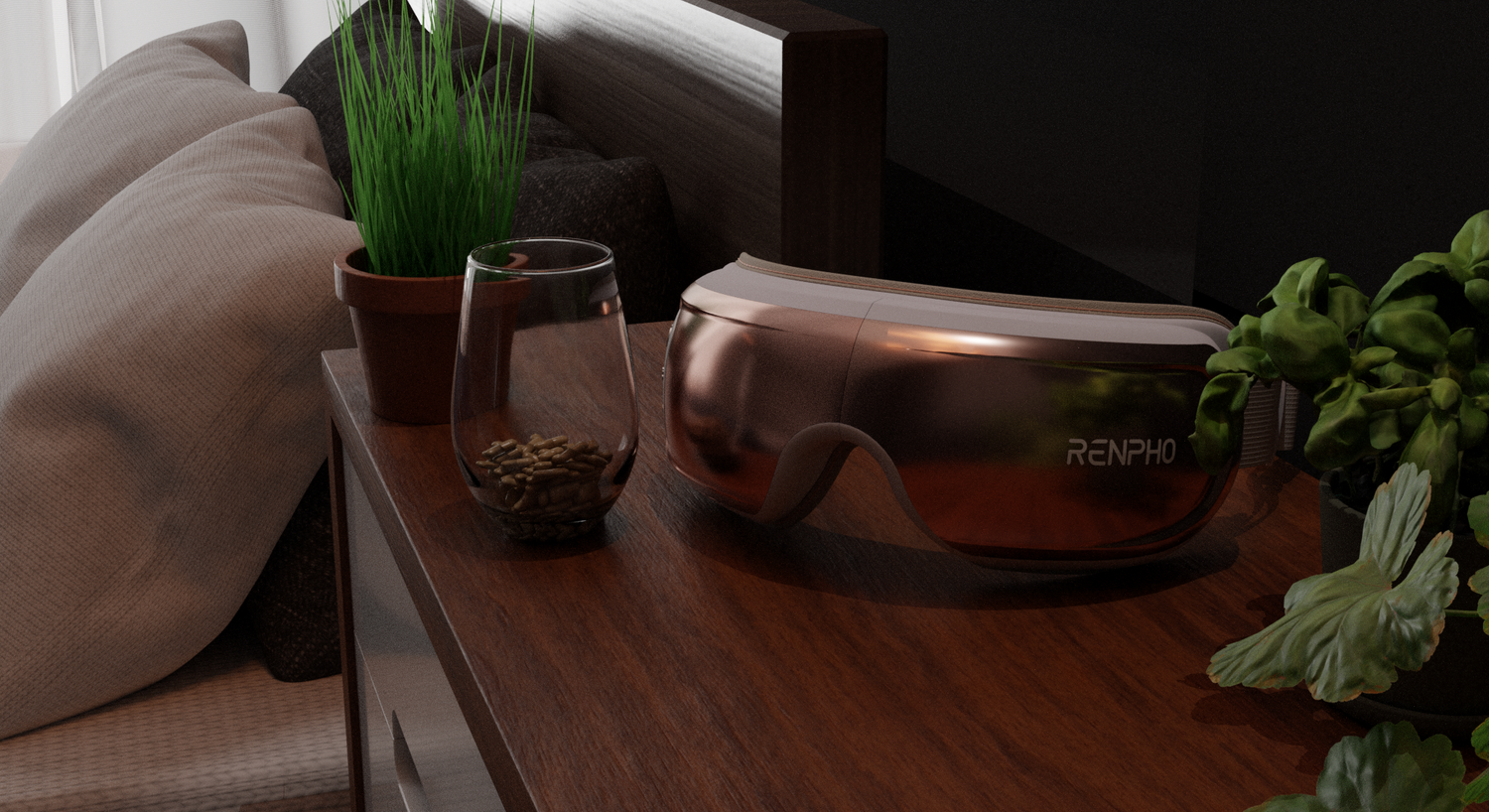
Natural Remedies vs. Heated Eye Masks: What Works Best for Dark Circles?
October 3, 2024
Read more >
-
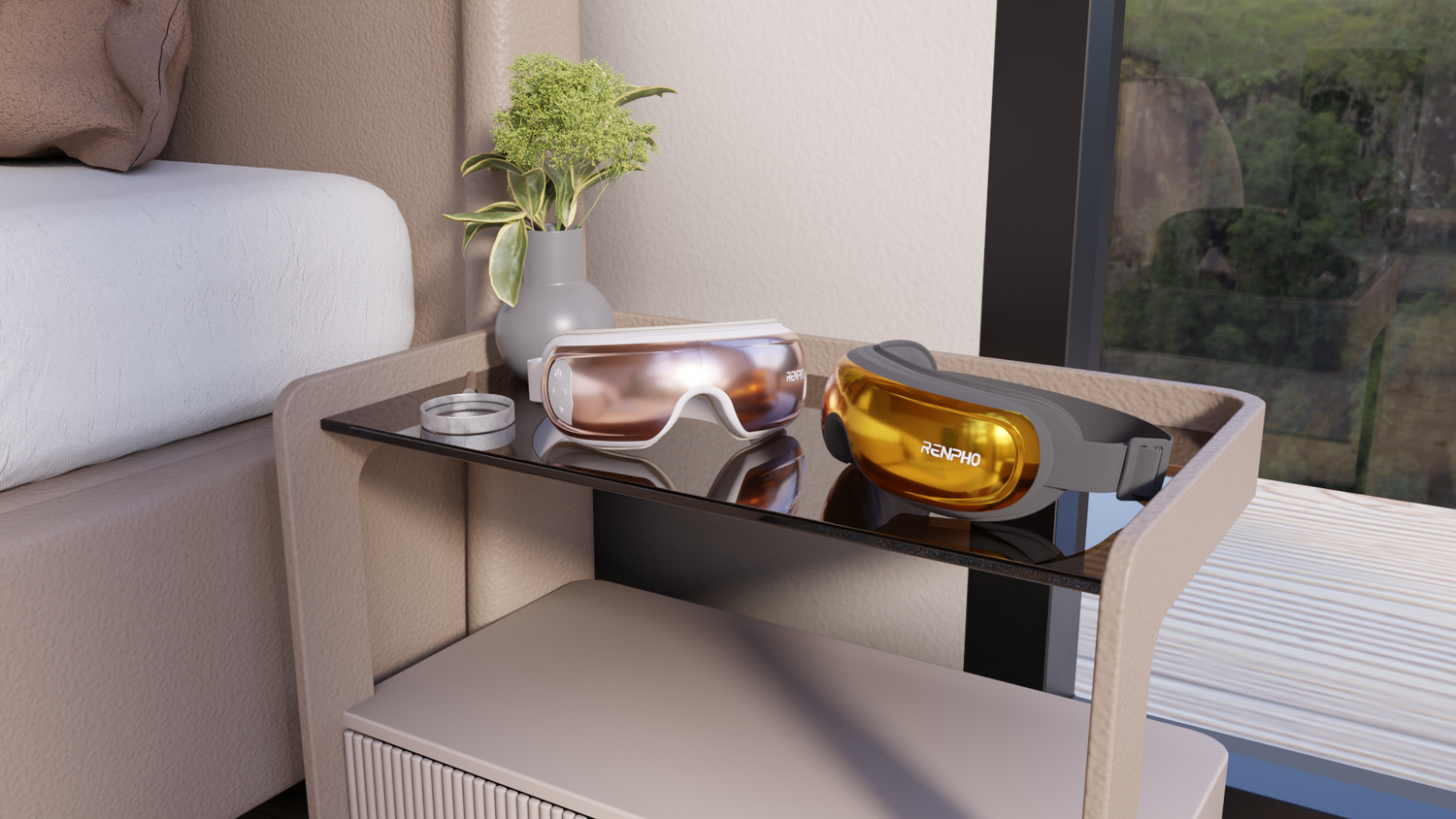
A Deep Dive into the RENPHO Eyeris 3: The Best Eye Mask for Quality Sleep
October 3, 2024
Read more >
-
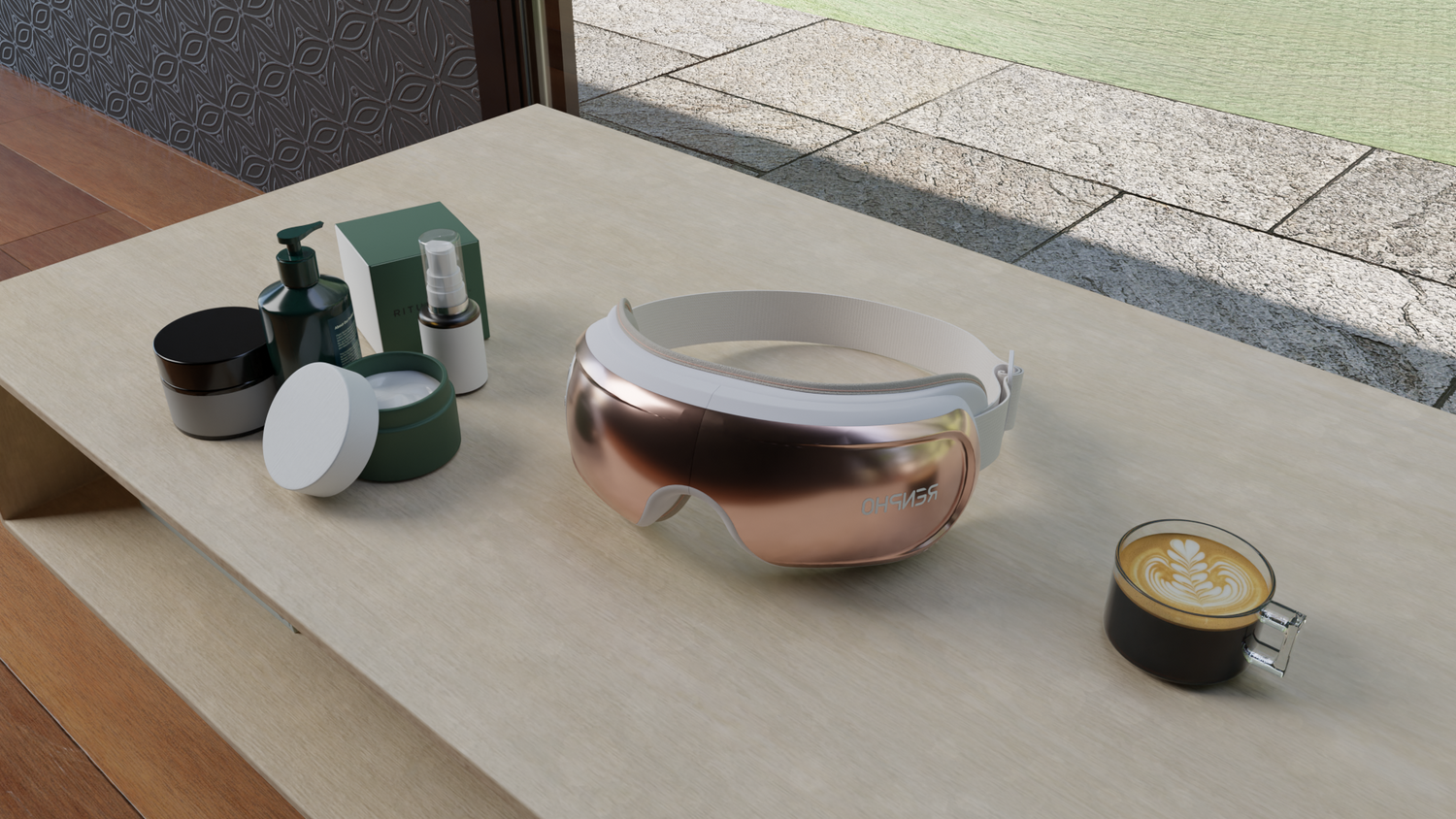
Bright Eyes, Bright Future: Banish Dark Circles this National Women’s Health and Fitness Day
September 25, 2024
Read more >
-
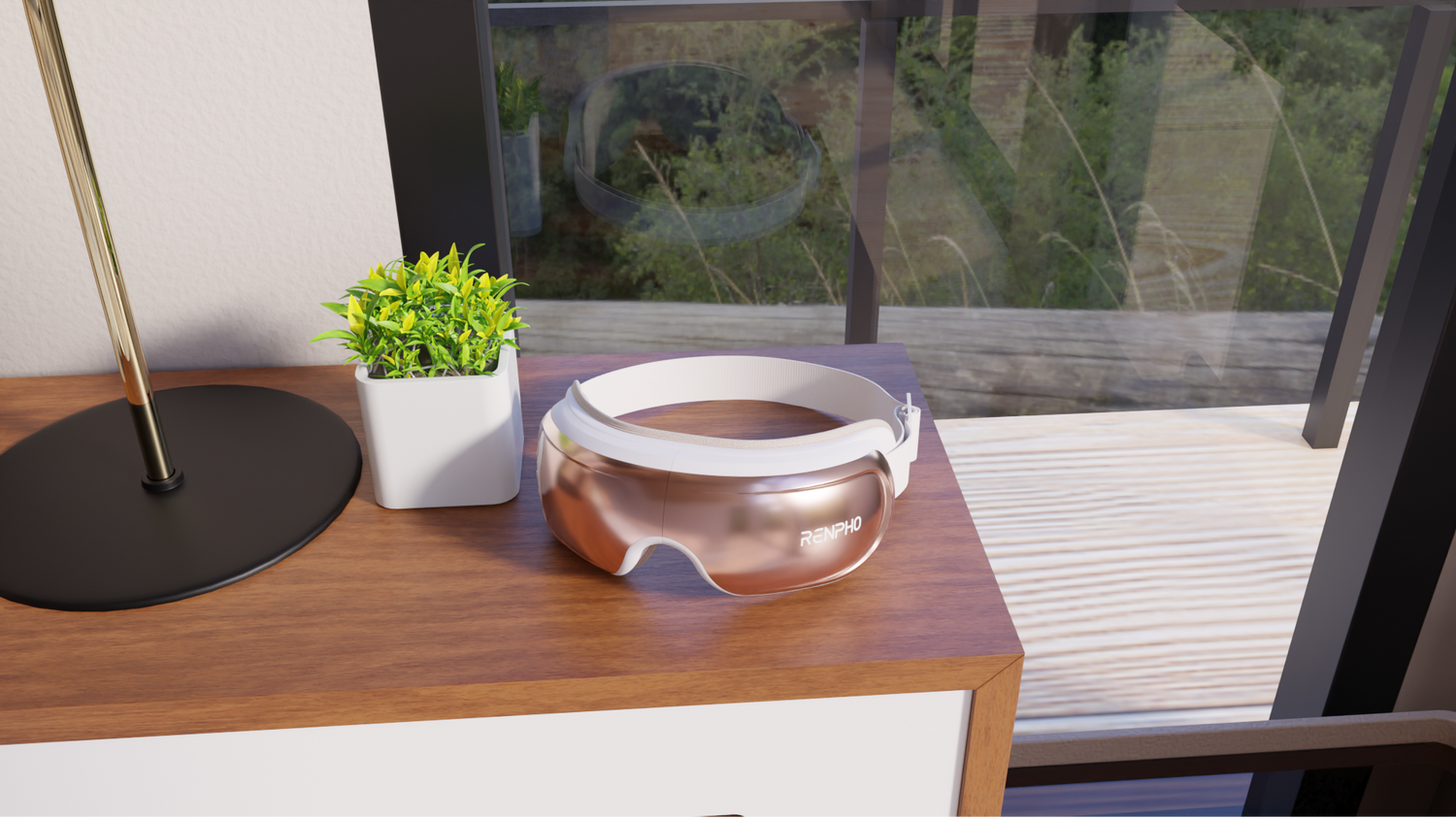
Eyeris 3 Rosé: The Best Eye Mask for Sleeping?
September 24, 2024
Read more >
-
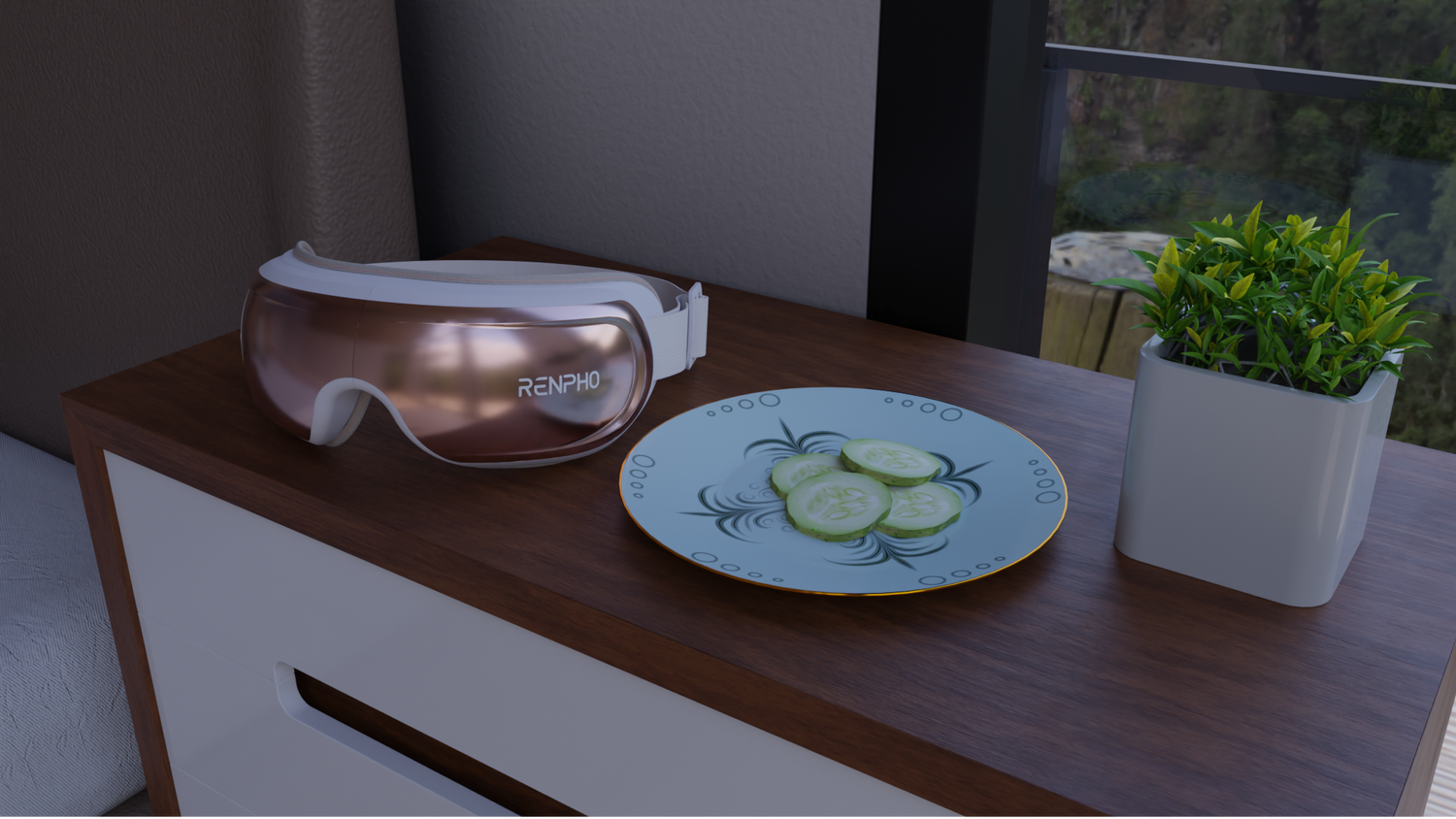
10 Effective Ways to Get Rid of Tired Eyes with an Eye Mask Massager
September 19, 2024
Read more >



































